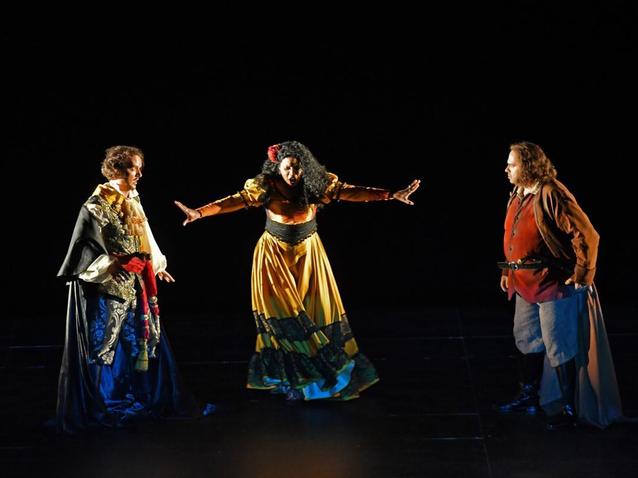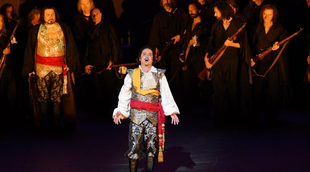 © (c) Antoni Bofill
© (c) Antoni Bofill
Yet another title from Verdi’s “popular trilogy” at Liceu. We had Rigoletto in March and now, to close the season, Il Trovatore.
Betting repeatedlyfor the most popular operas can be dangerous: whilst it is true that they bring with them a full house, they also generate disproportionate expectations in an audience that know them (of thinks to know them) by heart and who wish – often in vain – to listen on stage to the results that tend to belongmore to the “discographic” memory of the listener than to their live experience in theatres.
The Trovatore at Liceu obtained, at least musically, a global success with some irregularities. We have to consider an irregularity the fact that the wrongdoer of the gruesome story that is being told, the lascivious Conte di Luna, received a bigger applause than the protagonist, Manrico, full of virtue; and the gypsy Azucena, the fourth character in importance, triumphed over Leonora, the primma donna.

Artur Ruciński ; © Antoni Bofill

Marco Berti et Marianne Cornetti ; © Antoni Bofill
Indeed, the young Polish baritone Artur Ruciński is at the sweetest point in his career, the voice is very beautiful, velvety and has imposing presence at the same time. His sound was well rounded: full in the lower register, confident in the middle and with incisive brightness in the higher notes. His participation was active and decisive in the concertanti, sustaining and supporting them from a good grounded base. Moreover, Ruciński, with his good acting skills owned the stage space with ease. His performance of “Il balen del suo sorriso” – an aria which is riskier than it may look like as it is slow and requires a very precise administration of breath – was exemplary and was the most applauded moment of the night.
Marianne Cornetti’s Azucena was powerful and decisive. Her “Stride la vampa!” was also significantly celebrated. Towards the end, however, she was either getting into the character of the dying woman extraordinarily well or the singer was really showing signs of great fatigue. We will give her the benefit of the doubt.
Marco Berti was a good Manrico, he met the high demands of the hero’s score, but his scenic statism and his lack of musical enthusiasm caused his performance to remain flat. He sang “Ah, si, ben mio, coll’essere” with such lack of emotion and feeling that it made one doubt whether he was actually in love with the soprano.
Leonora, the feminine protagonist, was assumed by soprano Kristin Lewis. She reached the required notes, her performance was correct and so the audience appreciated it, but she had some tuning problems in the ornamented passages and her voice wasn’t particularly beautiful.
Very good job from the remaining secondary characters and, despite some unbalanced moments at the beginning of the famous “Squilli, echeggi la tromba” in the third act, the choir – having very popular pages and moments of particular brilliance in Il trovatore – was very good as well.
The production – co-produced with the Ópera de Oviedo – made from recycled scenery from the last Trovatore staged at Liceu years ago, repainted and with a totally new scenographic concept and dramaturgy assumed by Joan Anton Rechi, didn’t work very well.
The idea of setting the action during the Napoleonic wars in Spain, adding the figure of the painter Goya (mute character performed by the well-known actor Carles Canut) omnipresent on stage sketching his celebrated series of engravings “The disasters of war” wasn’t pertinent, clarifying nor enriching.
There was however a good actors’ direction, which gave life, continuity and interest to an otherwise anodyne production that will most probably not leave a perdurable trace in the artistic memory at Liceu.
the 21 of July, 2017 | Print
Comments